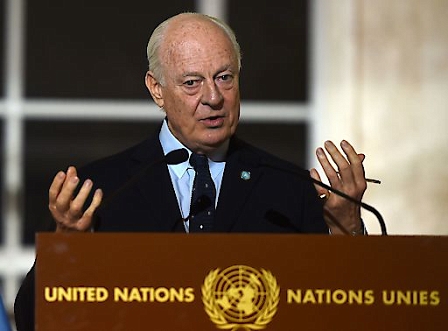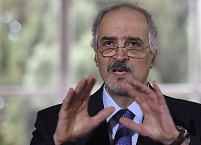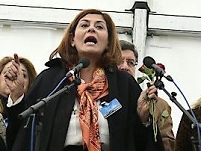Erstellt am: 16. 3. 2016 - 16:40 Uhr
New pressures and thinking outside the box
FM4 Reality Check
Hear the programme in the FM4 Player or subscribe to the podcast and get the whole programme after the show
The current round of talks on Syria got under way in Geneva yesterday, and with previous rounds having had only limited impact in terms of easing the situation on the ground in Syria, many people were sceptical that much would be achieved.
However, as the leaders from the different factions came together, it quickly became clear that something had changed. There was a new energy, a new resolve, that gave the proceedings a new atmosphere.
Reality Check asked our Geneva correspondent, Imogen Foulkes, why this time is different, and it seems that was a question which had occurred to her, too.
Imogen Foulkes: This is exactly the question I put to [United Nations Syria envoy] Staffan de Mistura on Tuesday evening. He agreed things had changed, that the mood was different from earlier times.
He gave three reasons: the refugee crisis, which Europe clearly is divided over, and has finally seen as a major humanitarian catastrophe that something needs to be done about; the humanitarian situation after five years in Syria; and of course he also mentioned Russia’s surprise decision to pull out – that is being seen, interestingly, by ALL sides as a positive move which could really help support the peace process.

AFP PHOTO / PHILIPPE DESMAZES
RC: What about the absent elephant in the room, as it were, the fact that the group calling itself Islamic State, Al Qaeda, Al Nusra Front, are not part of these talks, yet they are still very much responsible for some of the devastation that’s happening inside Syria?
IF: Interestingly, that was also a reason Mr. de Mistura cited for more impetus and momentum in these peace talks. The fact is, those groups have not been defeated despite efforts by opposing parties, by the Syrian government, by the Russians, by the United States, by the Syrian opposition that’s here in Geneva. They’ve all failed, and the idea is that this now viewed as the greatest threat, not just to Syria but to the whole region and that if THESE warring parties can’t make peace and concentrate on the really serious threat of Islamic State, then we’re going to have a massive, massive problem right across the Middle East.
RC: We heard today that Staffan de Mistura has rounded out his team of top advisors with a Russian expert on the Middle East, so we have these advisors involved – presumably they’re a key part of this whole mechanism?
IF: Yes. He [Staffan de Mistura] is creating a whole edifice of working groups. He’s appointed a Russian consultant, he’s got two Germans, two Swiss … these guys do not report to their governments, however. They’re academics, foreign policy wonks, and they report to Mr de Mistura. It’s fascinating to see how he is trying to broaden the expertise he has at his disposal, people who might find a way in to diplomacy that your standard diplomats have never even thought of. It think there are going to be books written about this diplomatic process in the end, because it’s unusual – I’ve witnessed a lot here in Geneva and there’s such a determination to try every way now to get peace, that some very, very interesting models and templates are being tried out and it looks like some of them are working.
RC: So there is a mood, a sense of something actually happening and moving forward?

AFP PHOTO / PHILIPPE DESMAZES
IF: There is, yes, and what we know is that each side, the Syrian government and the Syrian opposition have presented their vision, their written plan to Staffan de Mistura about how they think political transition can be achieved, because that, of course, is the aim of these talks.
RC: Is there any indication how far apart these plans are, and where there might be overlap?
IF: This is a very interesting question because, unlike in previous times when there was an awful lot of leaking, and spinning, and on-the-record-off-the-record briefing to the press, the press has not had much inkling of what’s in these two documents. The opposition was asked on Tuesday, “What are your points that you’ve given to the United Nations?”, and the opposition refused to say, which I think is an indication of seriousness, if you like. They want to work on the diplomacy behind closed doors, they want to negotiate. I would say, the future of President Assad is clearly a stumbling block. The opposition say that he shouldn’t have any role in a future government, and the Syrian government say they’re not going to discuss his role at all.
RC: One piece of news that does seem to have filtered out is the fact that opposition officials are raising the issue of detainees in government jails as one of their key demands. How significant is this?
IF: Well, it is significant in the sense that we know, and the UN Commission of Inquiry has reported tens of thousands of people in Syrian government jails, some of them subject to torture, subject to execution, and the call is, from the opposition, that there has to be movement on this, and Staffan de Mistura clearly and publically backed the opposition on this. He wants to see movement on detainees. But interestingly, it’s not part of the political negotiations. It’s a very clever diplomatic move by Staffan de Mistura. What he said was, “This is part of the things that have to happen in Syria, political transition or not. People in besieged areas have to have aid delivered to them, sieges have to be lifted, detainees have to be released, and torture must stop. There’s no negotiation about that; it’s not a political issue, it’s an international law, international humanitarian law issue.” So he has taken it out of the political process and put it into one of his humanitarian task forces, where Russia and America are also involved, pushing their clients, if you like, towards the negotiating table.
RC: How does it go from here?

AFP PHOTO / PHILIPPE DESMAZES
IF: What Staffan de Mistura seems to think is that we will reach some kind of common ground, and he actually indicated on Tuesday that we might be surprised by the amount of common ground there actually is.
Certainly, from the opposition, we’ve had quite heartfelt statements about their arrival here in Geneva to finally put an end to the ordeal of the Syrian people, and very moving from the opposition spokeswoman who said, “There has been suffering on all sides, and we regret all of it.” Which sounds quite olive-branch-like.
Dieses Element ist nicht mehr verfügbar
FM4 Reality Check
Monday to Friday from 12.00 to 14.00, Saturday from 12.00 to 13.00, and after the show via Podcast or fm4.orf.at/realitycheck.



